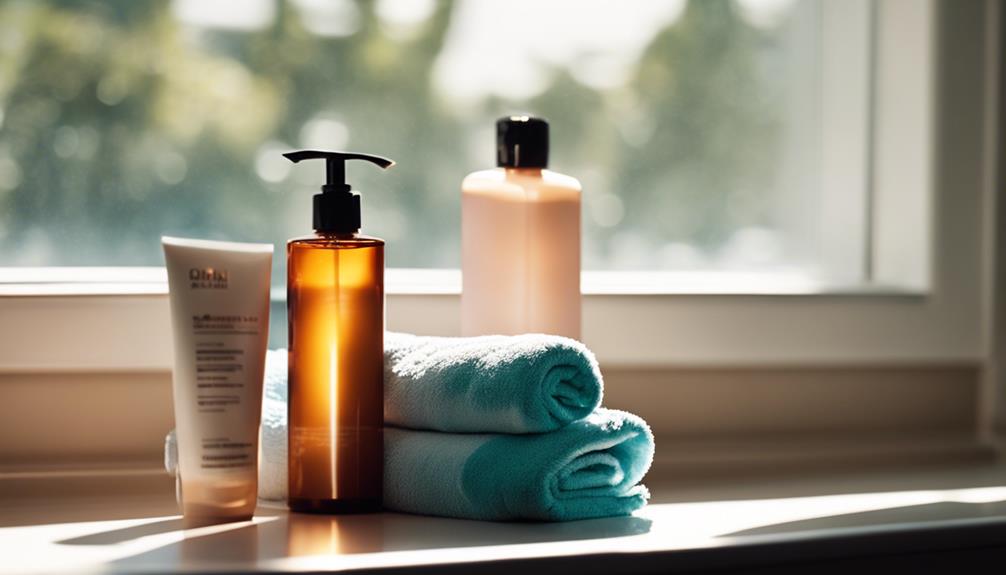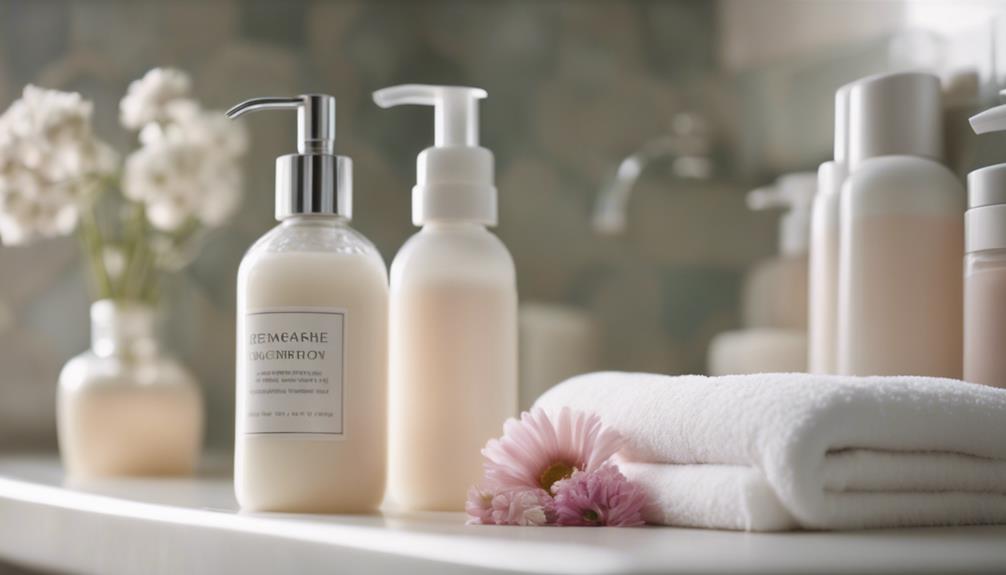Facial tanning can be a bit of a mystery, but once you know the tricks, it's not so tough! Your genetics play a big role; some skin types tan easily while others might just burn. Preparing your skin with exfoliation and hydration is super important for that smooth, even glow. Don't skip sunscreen! It protects you while still letting you tan. And hey, there are lots of ways to get that sun-kissed look, from self-tanners to spray tans. With a little patience and the right approach, you can rock a radiant tan that'll have everyone asking for your secret! Want to find out more?
Key Takeaways
- Facial tanning is influenced by genetics, affecting how individuals respond to sun exposure and tanning products.
- Gradual sun exposure is essential for sensitive facial skin to avoid irritation and achieve an even glow.
- Regular exfoliation and hydration enhance the tanning process, promoting a smoother and more radiant appearance.
- Using sunscreen with SPF 30 or higher protects facial skin while allowing for a safe tanning experience.
Genetic Influences on Tanning
Genetics play a crucial role in determining how well you tan, influencing your skin tone, melanin production, and susceptibility to sunburn.
If you've got fair skin, you might notice your friends getting that gorgeous glow while you're stuck with a lobster-red hue. It's all about melanin, the pigment that gives your skin its color. The less melanin you have, the more likely you're to burn. Isn't it unfair?
Your unique genetic makeup shapes your tanning journey, affecting how your skin reacts to sunlight. Some people tan like it's an Olympic sport, while others just look like they've been living under a rock!
Preparing Your Skin for Tanning

Preparing your skin for tanning involves essential steps that can enhance your results and protect your health.
First, give your face a good exfoliation to slough off dead skin cells, allowing for a smoother and more even tan. Think of it like polishing a car before a big showcase!
Next, keep your skin hydrated by drinking plenty of water and using a moisturizer. Hydration helps your skin glow and can make your tan last longer.
Also, remember to time your sun exposure wisely—early mornings or late afternoons are great for a gentle tan without the harsh rays.
The Role of Sunscreen

Using sunscreen is an essential step in your tanning routine, as it protects your skin while still allowing you to achieve that desired glow.
Think of sunscreen as your skin's superhero, battling harmful UV rays that can cause burns and long-term damage.
You'll want to choose an SPF 30 or higher for the best results, and don't forget to reapply every two hours—yes, even if you're having a blast!
Remember, a little extra effort can go a long way.
You might think sunscreen will stop your tanning progress, but it actually helps maintain healthy skin while you soak up the sun.
Plus, who wouldn't want a tan without the risk of looking like a lobster?
Exploring Tanning Methods

There are several effective tanning methods available that can help you achieve a beautiful, sun-kissed glow without risking your skin's health. You can choose from self-tanning lotions, professional spray tans, or even tinted moisturizers for a lighter touch. Each method has its perks, and you'll find one that fits your style!
| Tanning Method | Description |
|---|---|
| Self-Tanning Lotions | Build a natural-looking tan without UV rays. |
| Professional Spray Tans | Get a flawless finish with expert help. |
| Tinted Moisturizers | Lightly enhance your skin tone effortlessly. |
Whichever you pick, make sure to follow the instructions, so you don't end up looking like a carrot! Happy tanning!
Addressing Common Concerns

Common concerns about facial tanning often revolve around achieving an even glow while ensuring skin health and protection. Contrary to popular belief, achieving a healthy, sun-kissed glow does not require prolonged sun exposure. In fact, spending extended periods in the sun can lead to sunburn, premature aging, and an increased risk of skin cancer. Thankfully, there are various safe and effective methods for achieving a tan, such as using sunless tanning lotions or getting a spray tan. Unraveling the sunburntan mystery is essential for understanding the risks and benefits of tanning, and for making informed decisions about how to achieve a healthy and radiant complexion.
You might worry about your face not matching your body's tan, and guess what? That's totally normal! The delicate skin on your face can be trickier, so gradual exposure to the sun is key.
If you find that your face isn't tanning, it could be due to genetics or sensitivity, so don't sweat it!
And if your tan fades faster than your favorite show's finale, just remember to exfoliate gently and keep using SPF.
It's all about balance! With a little patience and care, you can enjoy a radiant tan while keeping your skin happy and healthy.
Hydration and Skin Health

Staying hydrated is essential for maintaining healthy skin, especially when you're aiming for a beautiful tan. When your skin's well-hydrated, it looks plump and radiant, which makes your tan appear even better! Plus, it helps prevent dryness and flakiness that can ruin your glow.
Here's why hydration is key:
- It supports your skin's natural barrier, keeping it protected.
- Hydrated skin absorbs nutrients better, enhancing your tanning experience.
- Drinking enough water can help reduce the risk of sunburn.
Tailoring Your Tanning Approach

Hydration plays a significant role in tailoring your tanning approach, as understanding your skin's unique needs will help you achieve a balanced and beautiful tan.
First off, you've gotta know your skin type—are you a sensitive soul or a sun-loving champ? If your skin's on the sensitive side, be extra cautious with sun exposure and stick to gentle products.
Next, prep your skin by exfoliating regularly. This step clears away dead cells, letting your tan shine bright!
Don't forget sunscreen; it's your best buddy, blocking harmful rays while still allowing some color.
Finally, consider alternatives like self-tanning lotions if you're wary of the sun.
With these tips, you'll be well on your way to a fabulous, sun-kissed glow!
Frequently Asked Questions
Can Certain Diets Enhance My Tanning Results?
Certain diets can enhance your tanning results. Foods rich in beta-carotene, like carrots and sweet potatoes, may boost your skin's natural glow. Staying hydrated and consuming antioxidants also supports healthy skin during your tanning process.
How Do Hormones Affect Skin Tanning and Sensitivity?
Hormones can boost melanin production, enhancing your tan, but they can also heighten skin sensitivity. Understanding this balance helps you navigate tanning effectively while protecting your skin from potential irritation or damage.
Are There Specific Vitamins That Improve Skin Tanning?
Yes, vitamins like A, C, and E can enhance skin health and improve tanning. They boost collagen production, protect against sun damage, and promote a more even tan. Consider incorporating them into your diet or skincare routine.
What Role Does Age Play in Tanning Ability?
As you age, your skin becomes thinner and less elastic, making tanning trickier. Yet, with proper care, you can still achieve a beautiful glow. Embrace hydration and protection to enhance your tanning experience effectively.
Can Stress Impact My Skin's Tanning Response?
Yes, stress can affect your skin's tanning response. It may lead to increased sensitivity, affecting melanin production and making it harder for you to achieve an even tan. Managing stress is essential for healthy skin.
Conclusion
So, there you have it! With the right prep, sunscreen, and a little patience, you can achieve that sun-kissed glow you've been dreaming of.
Remember, 'Good things come to those who wait,' so take your time and enjoy the journey.
Whether you choose natural sunlight or a sunless option, listen to your skin and tailor your approach.
Embrace your radiant complexion with confidence, and don't forget to have fun along the way!








